Do you have what it takes to be an entrepreneur?
There are certain ideas and notions about entrepreneurs that may discourage you from starting your own business.
These myths aren’t necessarily all true.
Furthermore, there are some theories about business owners that might encourage you to create a startup company.
Some of these are myths as well.
I want to clear up any misconceptions you might have about entrepreneurship.
We’ll go through the top 10 most common myths about entrepreneurs.
The information I’ll give you can help you determine if you’re an employee or an entrepreneur.
There’s nothing wrong with being an employee.
Personally, I find entrepreneurship more rewarding – but it’s not for everyone.
Being an entrepreneur takes commitment.
Once you start your business, it takes just as much effort to keep up and running.
You’ll need to learn different strategies like how to use relationship marketing to connect with your customers.
If you’re on the fence about building a startup company, take a look at some of the myths and misconceptions about entrepreneurs.
Then you can make a more informed decision about your future.
Myth #1: Entrepreneurs don’t have a personal life
Lots of people think that entrepreneurs work 24 hours a day, 365 days a year.
Working nonstop means that you won’t have time for your family, friends, and leisure activities.
While it’s true that entrepreneurship can take grueling hours and commitment, it’s not true that you can’t have a personal life.
Part of being your own boss means that you can schedule your own hours – to some extent.
I’m not saying you can take time off whenever you want, but there’s still enough time for family and social activities.
One of the keys to being a successful entrepreneur is mastering your time management skills.
If you can establish a proper working routine, you won’t have trouble finding free time.
Sure, it can be overwhelming when you have 100 things on your to-do list that need to get done.
But you can’t do everything at once – you can only do one thing at a time.
Stick to your schedule.
Don’t worry about tasks that you’re not focusing on at the exact moment.
Entrepreneurs need to limit multitasking.
Multitasking reduces productivity.
So, how do you limit multitasking and increase productivity?
- Schedule specific times to check and answer emails
- Prioritize your to-do list
- Put your phone on silent
- Get off social media (for personal use)
These are a few tips to get started.
Answering calls and emails while you’re working on a task is not an efficient use of your time.
Instead, stick to your to-do list.
Make sure you’re working on the most important tasks first.
Don’t waste time on social media – unless of course, it’s business related.
You shouldn’t be uploading old pictures of yourself from high school or vacation photos from last winter to your personal social media pages while you’re on the job.
Get back to work.
Entrepreneurs who can master their time management skills will have plenty of time for a personal life.
Myth #2: Entrepreneurs take lots of risks
Entrepreneurs take risks.
With that said, they don’t necessarily take lots of risks or put themselves in high-risk situations all the time.
Are there risks associated with starting and running your own business?
Of course.
Entrepreneurs learn how to take calculated risks.
It’s all about balancing the risk and reward.
You won’t have much luck getting high returns if you’re not willing to take some risks.
If there weren’t any risk – everybody would be doing it.
Entrepreneurs aren’t gamblers. Gambling implies there’s luck involved.
Sure – entrepreneurs may have some good or back luck over time.
But ultimately, you can’t rely on luck to run your business.
Sometimes you’ll take a risk that doesn’t pay off.
It’s bound to happen.
Not every idea will be a home run.
The key to persevering through mistakes is by limiting your initial risk.
You can’t take a risk that will put your company out of business if it fails.
So, yes – entrepreneurs take some risks.
But they’re not gamblers. They take calculated risks.
Myth #3: Entrepreneurs are only motivated by money
Would entrepreneurs start a business if they couldn’t generate a profit?
I doubt it.
However, financial gain is not the only motivation for small business owners.
It’s not even first on the list.
Achieving a lifelong dream is the main motivation for entrepreneurs.
Financial stability is second on the list.
Being financially stable means that you’re comfortable and able to make ends meet.
It doesn’t necessarily mean you’re filthy rich and buying Ferraris.
Money is definitely a motivator, but it’s not as important to entrepreneurs as people assume.
Interestingly enough, the amount of money you have can affect how happy you are.
These numbers contradict the saying, “Money can’t buy happiness.”
So you can’t fault entrepreneurs who have a financial motivation.
There are plenty of other incentives to starting your own business as well.
Entrepreneurs have flexibility and control.
Earlier we discussed how you could have a great personal life if you learn to use management skills.
Your hours can be flexible, and you have control over your life and decisions.
You also don’t have to answer to anyone except for yourself.
Leaving a legacy is another motivational factor for entrepreneurs.
Their business is something that can last even after they pass away.
It’s also something they can leave behind for their families and future generations.
Entrepreneurs are also motivated by freedom.
People have limited freedom in their jobs.
75% of workers don’t think their bosses keep the team motivated.
The lack of motivation in their current job can inspire people to leave and become an entrepreneur.
Money is not the only driving force in this decision.
Myth #4: Entrepreneurs raise money from venture capitalists
Not all entrepreneurs raise money from venture capitalists.
So where do people get funds to start a company?
Let’s take a look at the top funding sources.
Venture capital money is on the list, but personal loans, credit, friends, and family far outweigh the venture capitalist funding.
If you want to be a successful entrepreneur, you need to put up your own money.
You can’t guarantee on securing your finances from banks, angel investors, or VCs.
This relates back to what we discussed earlier about risk-taking.
Yes – entrepreneurs take risks.
Risking your own money is part of being an entrepreneur.
Based on the numbers above, you may also be risking money raised by your family and friends.
This isn’t necessarily a bad thing.
Sure, you don’t want to let yourself down.
But it’s extra motivation when you are responsible for repaying debts to your loved ones.
How much money do you need to raise to start a business?
It depends on the industry.
Starting a business may take less money than you think.
Let’s take a look at some well-known companies.
Hewlett Packard is worth over 30 billion dollars today.
They started with less than $600.
Obviously, this is an anomaly.
I’m not saying you can turn $600 into a multi-billion-dollar corporation.
I am saying that you can raise enough money between your personal savings, credit, and loans from family to get your startup off the ground.
You don’t need to secure funding from venture capitalists.
Myth #5: Entrepreneurs have great ideas
Some people may not attempt to start their own business because they don’t have a unique idea.
You don’t need to reinvent the wheel to be an entrepreneur.
There’s nothing wrong with taking an existing idea and making your own business out of it.
As long as you’re not infringing on anyone else’s trademarks, patents, or intellectual property – it’s fine.
Let’s look at an example.
I’m sure you’re familiar with Uber and Lyft.
Uber was founded in 2009.
Lyft launched in 2012.
These two businesses are more or less the same.
Are the founders of Lyft not entrepreneurs?
Of course they are.
Just because they used an existing concept to create their company, doesn’t change anything.
You don’t need a new idea to be an entrepreneur.
How many pizza shops are in your city?
Those restaurant owners didn’t invent a new concept when they decided to sell pizza.
With that in mind, learning how to generate ideas can still help your business.
Once you get started, you’ll want to come up with creative marketing tactics to grow your business.
Furthermore, you can have a great idea and not be successful.
If you don’t know how to raise funds, manage employees, budget your finances, and market your company – your business won’t last.
Just because someone has a new and innovative idea, product or concept, it doesn’t make them an entrepreneur.
Make sure your customer service strategy can support your idea.
Let’s say you have a unique product, service, or invention.
If your customers aren’t getting good service, they won’t support your business.
Being a successful entrepreneur is much more than having a good idea.
If you don’t have the knowledge and skills to acquire and retain your customers, your business is in trouble.
For those of you that want to be an entrepreneur but can’t think of a good idea – don’t worry about it.
Instead, think of an existing idea that you can improve.
Look back at the example we used earlier with Uber and Lyft.
Uber created a business that improved on the concept of taxis and car service companies.
Lyft built their model replicating Uber’s success.
You can do the same thing in an area of your expertise.
Myth #6: Anyone can be an Entrepreneur
There are over 7 billion people in the world.
What do all of these people do?
Most people are not entrepreneurs.
Not everyone can be an entrepreneur.
Based on the graphic above, entrepreneurs make up a small amount of the population compared to other professions across the world.
Not everybody has what it takes to start and run their own business.
Not everyone has the personality or resources to do this either.
So, who has what it takes to be a successful entrepreneur?
Let’s look in the United States.
Immigrants play a large role in the United States entrepreneurship field.
Why?
It takes a certain type of mentality to uproot your life and move to another country.
People come to America because it’s the land of opportunity.
You need to be highly motivated to be a successful entrepreneur.
So can anybody be an entrepreneur?
It’s a tricky question. In theory – yes.
Based on the graphic we just discussed, you don’t even need to be born in the country to be a successful entrepreneur.
I moved to this country when I was two years old.
But with that said, even if you’re born in the U.S. and have plenty of financial resources and connections, you might not have the mentality of a successful entrepreneur.
Myth #7: Entrepreneurs have formal training and education
You don’t need to study business or entrepreneurship to have a successful startup company.
People that want to start their own company may not pursue a college degree to avoid student loan debts.
Private colleges in 2017 cost an average of $49,320 per year.
Entrepreneurs may realize they don’t need a degree to accomplish their dreams of starting a business.
While education helps, it’s not completely necessary.
In fact, the majority of entrepreneurs do not have a college degree.
Only a quarter of entrepreneurs graduated college.
What do these numbers tell you?
You don’t need higher education to start your own business.
Don’t get me wrong – I’m not saying that you shouldn’t go to college.
I’m just explaining that it’s not a requirement and these numbers above are proof.
Myth #8: Entrepreneurs are young
Age has no limitations when it comes to entrepreneurship.
People may have reservations about starting their own business because of their age.
That’s no excuse.
If you’re unhappy with your current job and you have the mentality, funds, and resources to be an entrepreneur – go for it.
Don’t believe me?
Let’s look at some famous entrepreneurs.
The timeline illustrates that age is just a number and not relevant for entrepreneurs getting off the ground.
Location also makes a difference.
For example, the average age of an entrepreneur in the United States is 40 years old.
But the average age in the United Kingdom is 47.
Older individuals have accomplished more in their life.
They know what it takes to be financially stable and successful.
Experience is an advantage.
However, entrepreneurship is on the rise for younger generations.
Millennials want to be entrepreneurs.
Over 70% of teenagers have interest in starting their own business.
More than half of Millennials have plans to start a company within the next year.
These trends may eventually change the numbers for the average age of entrepreneurs.
But with that said, it’s still a myth that all entrepreneurs are young.
Myth #9: Entrepreneurs don’t quit until they succeed
While the mentality of entrepreneurs may not accept failure, the reality is quite different.
Entrepreneurs will fail.
It comes with the territory.
Let’s look at some examples.
Healthcare startups may sound intriguing for because of the potential profits.
But you can’t succeed without proper planning and expertise.
It’s not easy to start and run your own business.
You need to accept failure as a potential reality.
If your business is going to fail, you need to do whatever you can to minimize the damage.
Liquidate your company assets and try not to lose your entire investment.
Rather than looking at just one industry, like the healthcare example above, let’s take a look at the success rates for all startup companies.
These numbers show that the odds of success are less than the odds of failure.
So to debunk the myth – yes, entrepreneurs have to quit without succeeding.
It’s the sad truth.
With that said, just because one business failed, it doesn’t mean you can’t start another one.
Just learn to accept failure when it’s coming, minimize the damage, and move on.
Learn from your failures and don’t make the same mistakes twice.
Myth #10: Entrepreneurship is genetic
You are not born an entrepreneur.
It’s not a trait that you can inherit from your parents.
Even if your entire family runs their own business, it doesn’t mean that’s your destiny as well.
On the flip side, this means you can be an entrepreneur even if your family doesn’t own a business.
Let’s say your parents have a company.
Should you automatically go into that business?
The odds of you succeeding are against you.
Here’s a breakdown of family-owned businesses by generation.
- 30% survive to the second generation
- 12% survive to the third generation
- 3% survive to the fourth generation
Why do they fail?
They don’t have a proper succession plan.
There’s nothing wrong with wanting to work for your family’s business and eventually take it over.
Just understand that the statistics are against you.
It’s not impossible.
It just means you’ll need to work that much harder to be successful.
Conclusion
Entrepreneurship is not easy.
There are many misconceptions about what it’s like to be an entrepreneur.
Just because you run your own business, it doesn’t mean that you won’t have time for your family.
Entrepreneurs can have a social and personal life.
It’s all about balancing their time management skills.
There is risk associated with a startup company.
However, these risks don’t translate to the notion that all entrepreneurs are gamblers or high risk-takers.
Most entrepreneurs do not have a college education.
You don’t need a brand new idea to be a successful entrepreneur.
Look at these numbers from the e-commerce industry across the world.
These businesses didn’t reinvent the wheel.
They took an existing business model of selling products online and applied it to their own companies.
You just need to make some modifications to give your company an edge over competitors.
Use my tips to boost your e-commerce store revenue.
Although theoretically anyone can be an entrepreneur, not everyone is cut out for the job.
With that in mind – age is not a restriction.
The majority of entrepreneurs in the United States are middle-aged.
However, a large percentage of younger generations are interested in starting their own businesses.
Being too young or too old is not an excuse.
Entrepreneurs can accept failure.
Failure is a tough pill to swallow, but it happens.
It’s especially difficult since the majority of your funding will come from your own savings as opposed to venture capital investment.
Money isn’t the only motivational factor behind business owners.
While financial gain is a perk, there are other rewards to owning your own company as well.
Nobody is born an entrepreneur.
It’s something that you need to truly want and work for to accomplish.
Now that all 10 of these myths have been cleared up – you can make an informed decision whether or not to pursue the path of entrepreneurship.
Which myth about entrepreneurs were you most surprised to hear isn’t true?

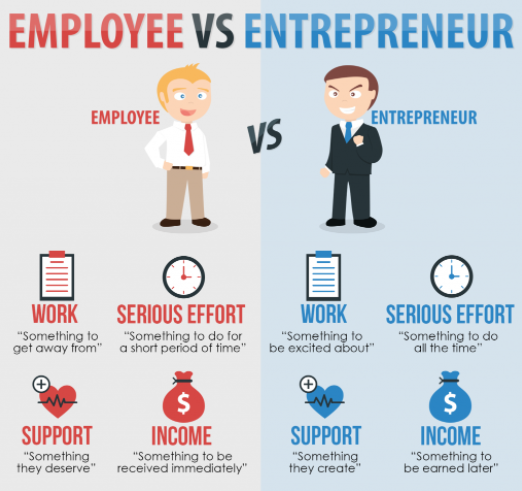

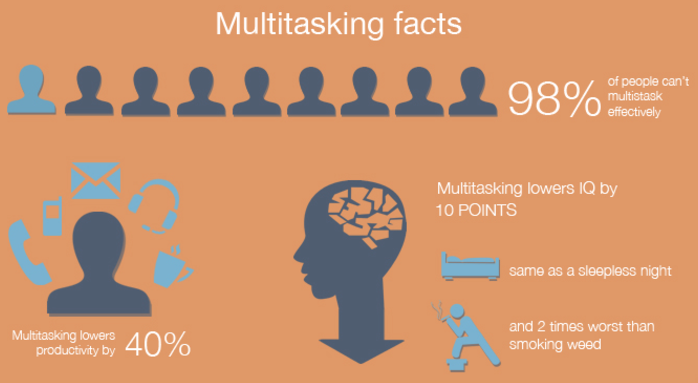




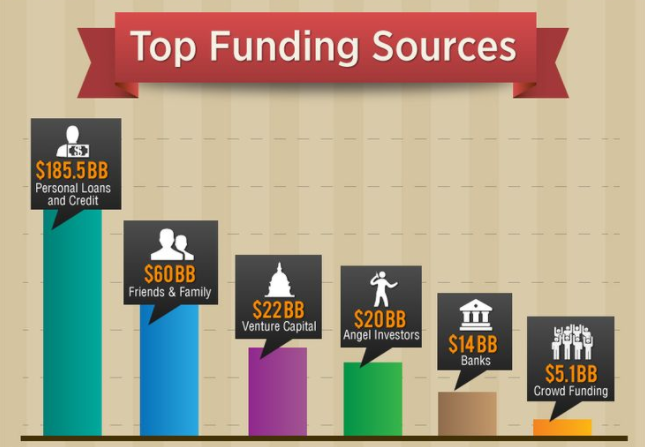
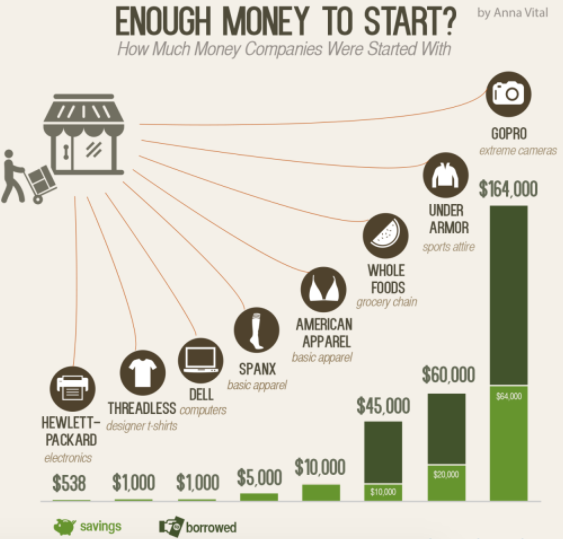
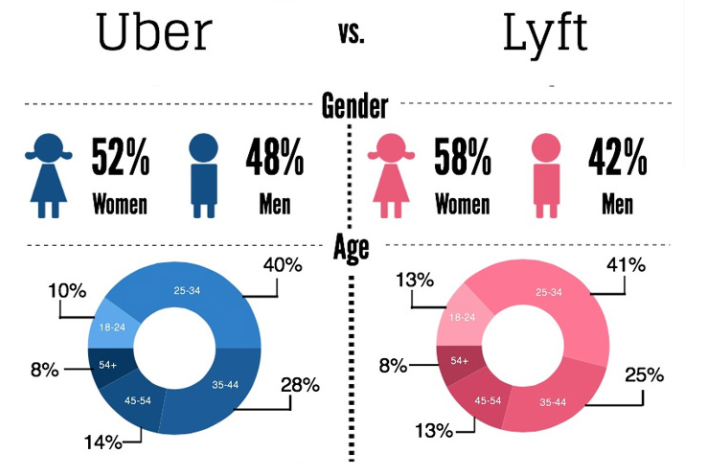
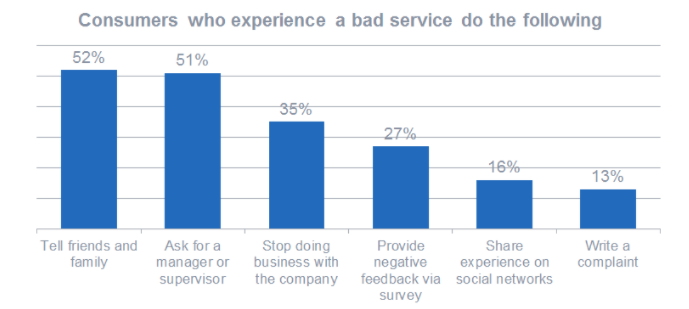
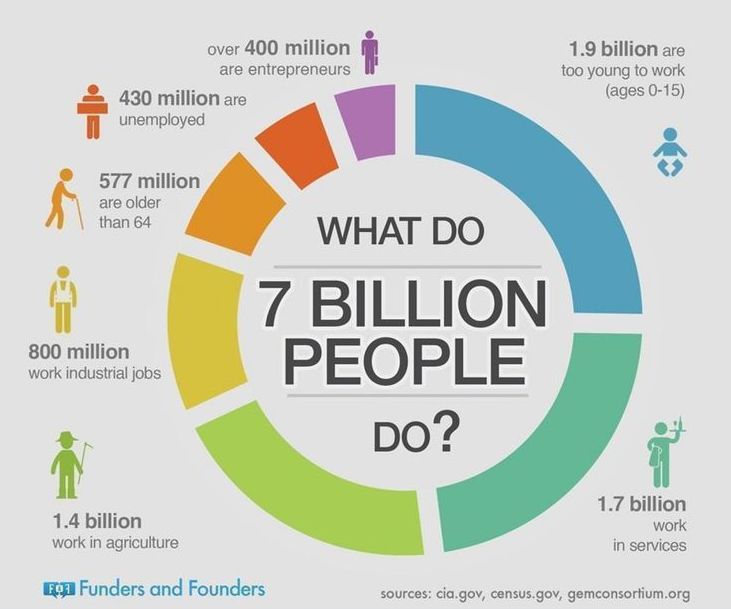


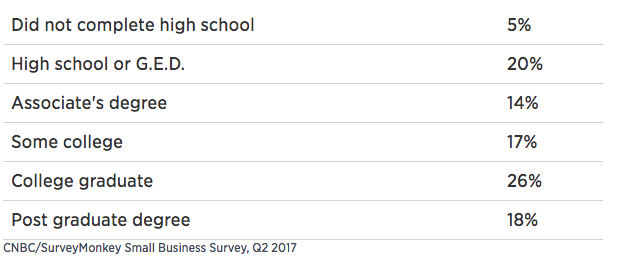

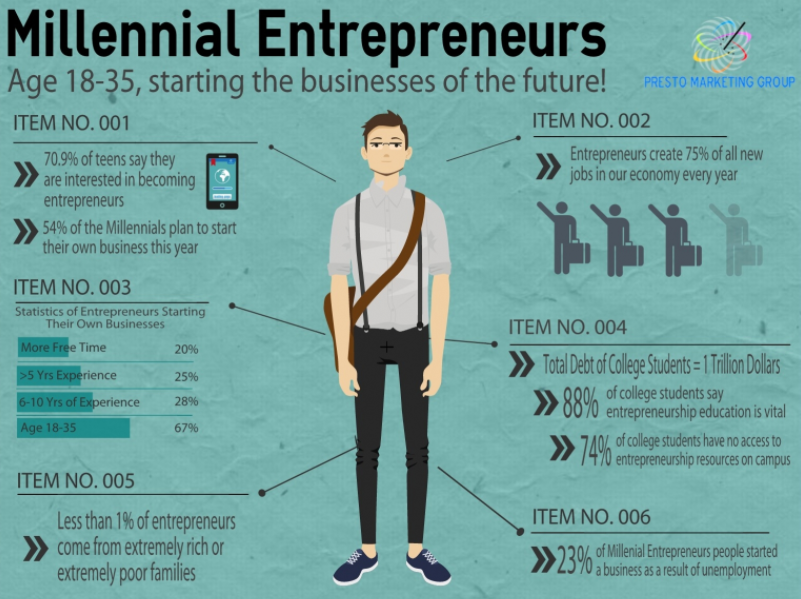
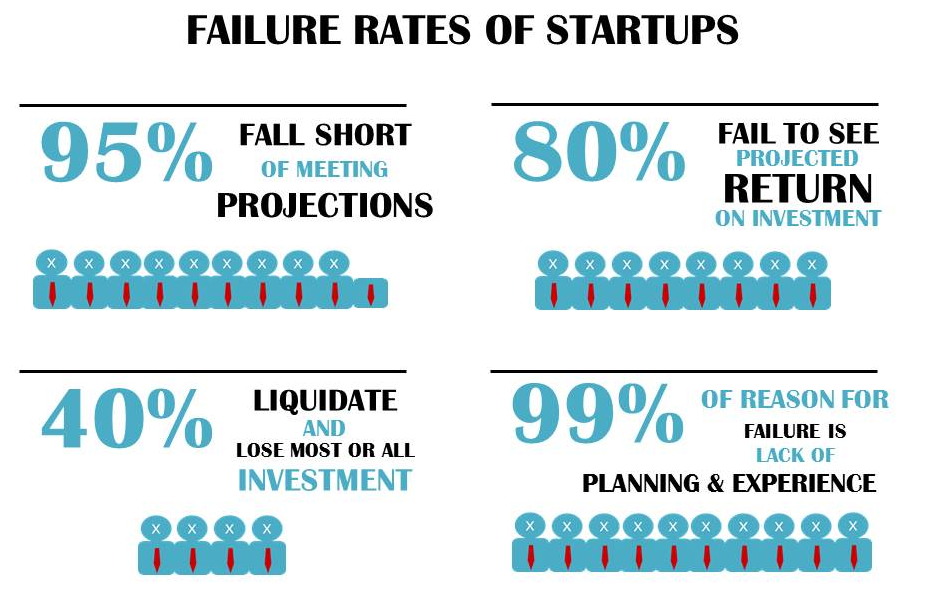
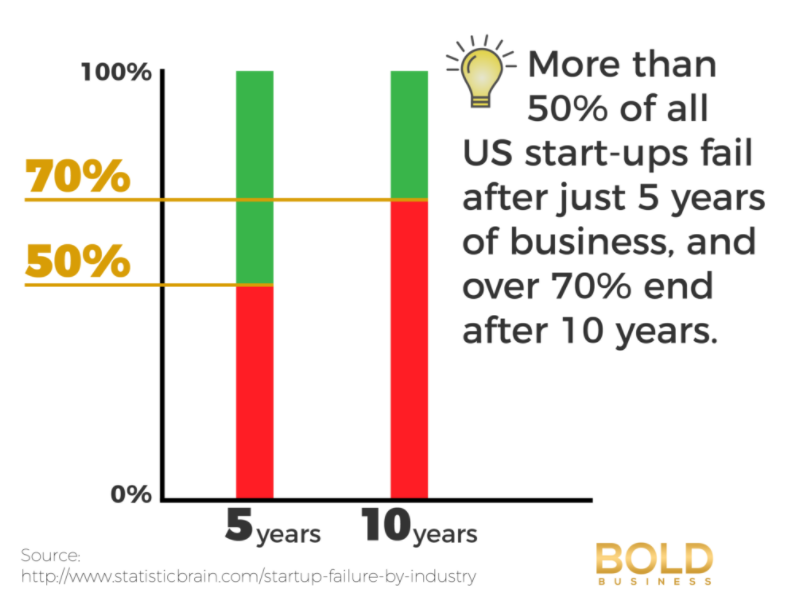
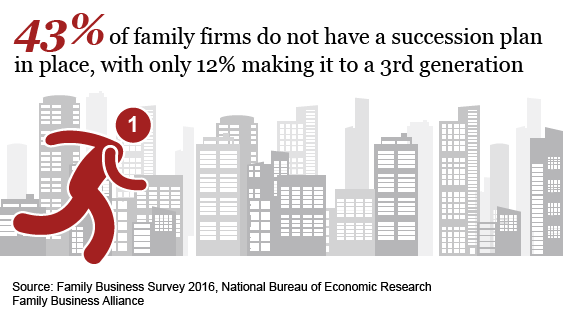

Comments (8)